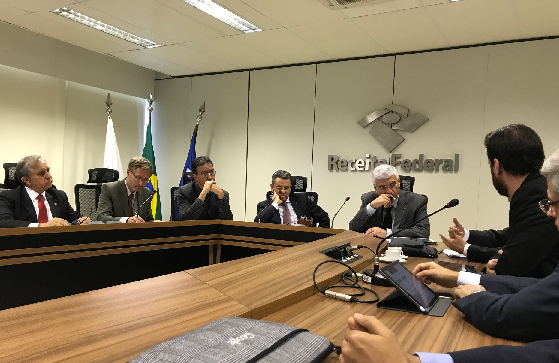
Representatives of ABES, Assespro, Acate and Fenainfo met with the Secretary of the Federal Revenue, Jorge Rachid, yesterday (13/06), in Brasília (DF) to demand the maintenance of the public policy, created in 2011, which established the CPFP Model (Social Security Contribution on Payroll). Federal Deputy Izalci Lucas Ferreira (PSDB), president of the Parliamentary Science and Technology Front, also participated in the meeting.
This model has collaborated to increase the competitiveness and development of the IT sector, and its benefits are threatened by the edition of MP 774, which ends with the exemption of payroll for most sectors currently benefited and establishes only the CPRB Model ( Social Security Contribution on Gross Revenue) for all companies in the IT sector – large, medium and small.
At the meeting, a document was delivered to the Secretary of the Federal Revenue in which the associations claim the peaceful coexistence of the two contribution models: the CPRB and the CPFP, so that companies can choose the one that best serves them and, in this way, the government would understand and would respect the diversity of the IT industry.
Francisco Camargo, president of ABES, also observed that over the years “more than 50 sectors, not initially foreseen in this public policy, designed specifically for the ICT sector, ended up being aggregated. These additions deviated the policy from its original intent. It is important to evaluate segment by segment, as IT generated jobs, reduced informality and increased collection in other taxes, such as INSS and FGTS”.
Read excerpts from the document:
“The IT sector is profoundly heterogeneous, ranging from the traditional large companies with low added value to the more dynamic high technology sector, dominated by innovative Small and Medium Enterprises, which are developing new models of business, such as SaaS – Software as a Service, Cloud – processing and storage in the Cloud, BlockChain, Internet of Things, Artificial Intelligence and others, making it impossible to oblige one model or another of Contribution, under penalty of protecting large companies with the adoption of Obligatoriness, and compromise the technological future of Brazil.
(…)
Returning to the Status Quo prior to MP 774 would avoid the inevitable price increase, as a software manufacturer, working with distributors and resellers, would have a cumulative increase in costs if it adopted something different from the one prior to MP 774, with three layers of taxes CUMULATIVE, reaching the end consumer, with an increase of more than 15%.
We are sure that macroeconomic technical studies by the Federal Revenue Service will confirm that the simplest solution that best serves the interests of the Government and Brazil is precisely what has already been done for the other three sectors, the Return to the Status Quo ante 774” .












